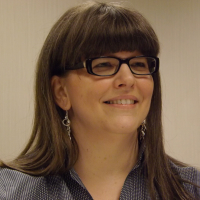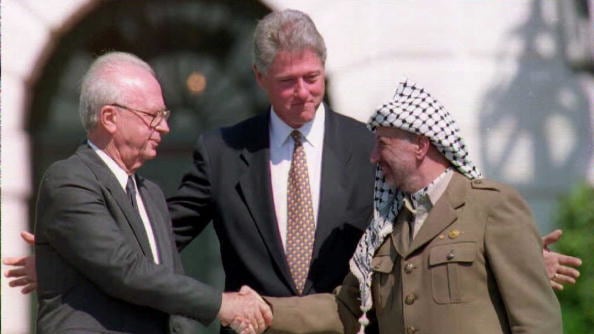I first started advocating for a two-state solution when I lived in Israel, during the first intifada. At the time I was often called an “Arab f-cker.” When the Oslo Accords were signed, I danced in Tel Aviv’s streets.
A few years later, though, when my Jerusalemite husband and I moved temporarily to the U.S., Oslo was already in tatters. In Israel I was still being called an Arab f-cker, but once I’d landed on America’s shores, I found that people like me were more likely to be called “Nazis.”

The second intifada broke out. The Jerusalemite and I came to understand that the Israel in which we’d hoped to raise a family—an Israel marked by reconciliation and responsibility—was further away than ever. We decided that we wouldn’t bring our Jewish children to the Jewish State, “for the time being.” I began to write about the politics behind that decision for papers like Chicago Tribune and The Dallas Morning News, and it turned out that in addition to everything else, I was also a bad Jew and—all unto myself—a fifth column.
The years waxed and waned and as Israel’s wholesale dedication to occupation and settlement only deepened, “for the time being” became permanent. Slowly but surely, new epithets began to emerge. I am also, it turns out, anti-Palestinian. A bigot. A settlement apologist. What had once been a radical, unthinkable leftist position was now seen by many as that of a Quisling and/or colonialist and/or your typical, insatiable Jew—in addition to still being radical and unthinkably leftist. It kind of depends on your perspective.
But despite what my mother may tell you, I’m not all that special. Anyone who’s ever advocated for two states knows what I’m talking about—they’ve been called all these things and worse, as Mira Sucharov attested in these pages just the other day. They’ve been made to feel alone and isolated within their communities and have often been threatened, from within their communities and without. And whatever bad names we may be called, it’s nothing compared to what activists face on the ground in Israel/Palestine, struggling for justice in the face of military occupation every day.
As the second intifada ground on, it became clear to many American Jews that this community—the one that sends money, Congressional votes, and the occasional son or daughter to the Jewish State—had to take a part in trying to end the immorality of the occupation. That we couldn’t claim to love Israel while turning a blind eye to its government’s sins.
People began to act. Some drew on examples set decades ago by the likes of Rabbi Arnold Jacob Wolf and the two-state supportive Breira. Some drew on examples set by Israelis marching in the streets. Some met and spoke with Palestinians and found the narrative they’d heard their whole lives beginning to crumble. Brit Tzedek was formed, then J Street; in 2010, public intellectual Peter Beinart produced a 5,000-word essay entitled “The Failure of the American Jewish Establishment.”
To say that Peter’s essay shook our community would be gross understatement, but the clamor that resulted has to be understood in context: He was channeling something. People who had previously watched from the sidelines were beginning to take part; people who’d been whispering were starting to speak up.
And so, when Peter arrived at the 2011 J Street conference, the reception was rock-star-esque. The gratitude these Jews felt that someone (not just any someone, but someone with a broad audience, someone with a mainstream platform) had said what they’d been feeling for years was palpable, an almost living, breathing thing. That gratitude breathed hope into people who had lost it.
The newspaper business was in the throes of a wasting illness, however, and I’d accepted that I would never again write professionally about Israel/Palestine. I did contract work for others, I blogged for free in places that few people visited. And then Peter wrote The Crisis of Zionism. There was going to be a blog, to support and further the conversation. I got a call: Would I like to work on the blog?
Yes. Yes, I would like to work on your blog.
It’s hard for me to express the gratitude I’ve felt for the opportunity to be involved in this project. To work within the framework of a mainstream publication, at an outlet in which the voices of diaspora and Israeli Jews routinely run side by side with those of Palestinians and Iranians (-Americans and otherwise), an outlet which amplifies discussion over conformity—an outlet predicated on the notion that diplomacy and compromise are good things—this was nothing I’d ever expected to find.
The best part, though, was the knowledge that there was an audience hungry for what we were producing. There are readers all over the world who had been looking for a place that gave expression to the ideas they discussed quietly with friends, a place that would call out America’s “pro-Israel” rhetoric and official Israel’s own distortions, a place that offered a broader vision of history than the one they’d been provided since childhood. Created and nurtured by people of enormous good will, Open Zion has also served to channel an existing mood, and we have been extremely fortunate to have had the opportunity to do so.
I don’t know how to end this, other than to say thank you—first and foremost to Peter Beinart, who created this space and thus allowed a conversation to flourish, but also to all my editors from Day One—Elisheva Goldberg, Raffi Magarik, Ali Gharib, Sigal Samuel, and Lisa Goldman—and mostly, to our readers. Thank you. I’ll be writing for Haaretz now and then, so you can always look for me there, but in the meantime, it’s nice to know that whatever kind of monster I may be, I’m in good company.






